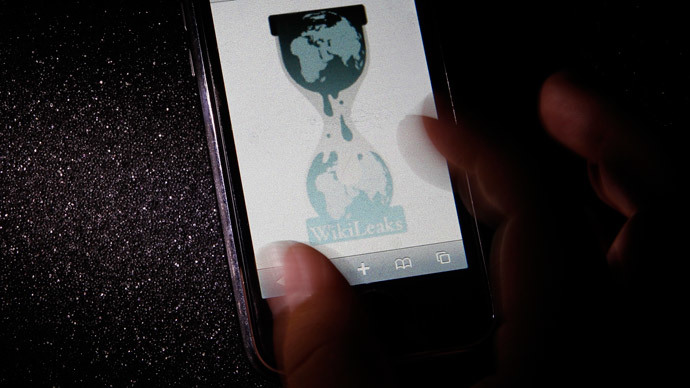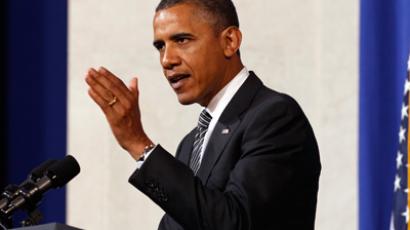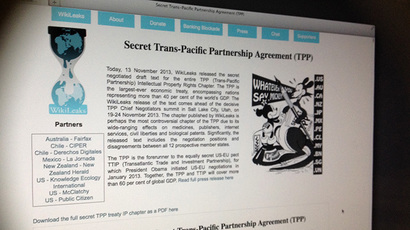WikiLeaks: US pushes to extend drug monopolies in secret proposed trade deal

Excerpts from a proposed international trade agreement leaked to the web this week suggest that the United States is pushing for changes that would make it more difficult to get life-saving drugs overseas.
On Thursday, transparency group WikiLeaks published a draft chapter from the Trans-Pacific Partnership (TPP) agreement which 12 countries, including the US, have been negotiating in near total privacy for years.
According to the secret-spilling organization, the latest leaked chapter — an excerpt from May 2014 detailing proposed intellectual property, or IP, rules — indicates that American trade reps want to maintain a monopoly on life-saving drugs and stifle efforts from foreign nations to obtain such products affordably and with ease.
A portion of the chapter backed by the US, WikiLeaks wrote in a statement that accompanied Thursday’s unauthorized disclosure of the draft document, would “force Parties to enact an automatic monopoly period (marketing exclusivity) for life-saving drugs, with a choice for the groups to decide for definitive inclusion within the treaty of 0, 5, 8 or 12 years.”
“Experts state that the United States is pushing for the maximum 12 years, with the countries' Ministers to decide as the IP negotiators cannot agree on this controversial issue,” WikiLeaks reported. According to their analysis, achieving as much if and when the TPP is finally approved could have catastrophic results and run counter to exactly what the White House has said in the past.
“Administration will have gone back on its promise to make cancer drugs affordable, having previously pledged to reduce the monopoly period on biotech drugs from 12 to 7 years. This will mean patients needing these drugs will remain with hugely expensive medical bills for years to come. These costs are also generally unattainable for citizens in the developing countries in the TPP,” WikiLeaks said.
Julian Assange, the editor-in-chief of WikiLeaks, said in a statement that: “The lack of movement within the TPP IP Chapter shows that this only stands to harm people, and no one is satisfied. This clearly demonstrates that such an all-encompassing and divisive trade agreement is too damaging to be brought into force. The TPP should stop now.”
Indeed, analysts at the Washington, DC-based Public Citizen consumer rights advocacy group raised concerns of their own about the draft this week.
“The text includes US-backed measures that would expand
pharmaceutical monopoly power and compromise access to medicines
in Pacific Rim countries,” the group said. “Deep
resistance to these measures from many negotiating countries has
endured for years. The US has dropped some harmful proposals, but
continues to insist on many others.”
Providing longer-term monopolies for the companies that produce
life-saving drugs, Public Citizen agreed, “contradicts the
policies included in recent White House budgets and if adopted
would undermine key cost savings touted by the
administration.” Nevertheless, passage of the TPP in this
form would allow little room for change, the group said, because
“Congress would be unable to reduce monopoly periods without
risking significant penalties and investor-state
arbitration.”
“With billions at stake, Big Pharma wants the TPP to be a road map for rules that will govern Pacific Rim economies for the next several decades,” Public Citizen said.
“The leak shows our government demanding rules that would lead to preventable suffering and death in Pacific Rim countries, while eliminating opportunities to ease financial hardship on American families and our health programs at home,” Peter Maybarduk, the director of that group’s Global Access to Medicines Program, said in a statement.
Representatives from 12 nations in all — the US, Japan, Mexico, Canada, Australia, Malaysia, Chile, Singapore, Peru, Vietnam, New Zealand and Brunei — have been involved so far in TPP negotiations, and are scheduled to meet later this month in Canberra, then Sydney, to further discuss the proposal.
Much to the chagrin of WikiLeaks and other transparency advocates, the TPP has been negotiated almost entirely in secrecy since the start of discussions.
“No wonder they kept it secret,” online entrepreneur Kim Dotcom of New Zealand previously told RT’s Andrew Blake when WikiLeaks published a chapter of the TPP late last year. “What a malicious piece of US corporate lobbying. TPP is about world domination for US corporations. Nothing else. We will stop this madness in New Zealand.”
According to WikiLeaks, the group’s decision to publish a TPP excerpt last November may have forced some trade reps in the months since to reconsider certain aspects.
“Since that point, some controversial and damaging areas have had little change; issues surrounding digital rights have moved little. However, there are significant industry-favouring additions within the areas of pharmaceuticals and patents. These additions are likely to affect access to important medicines such as cancer drugs and will also weaken the requirements needed to patent genes in plants, which will impact small farmers and boost the dominance of large agricultural corporations like Monsanto,” WikiLeaks said. “Nevertheless, some areas that were highlighted after WikiLeaks' last IP Chapter release have seen alterations that reflect the controversy; surgical method patents have been removed from the text. Doctors' groups said this was vitally important for allowing doctors to engage in medical procedures without fear of a lawsuit for providing the best care for their patients. Opposition is increasing to remove the provision proposed by the US and Japan that would require granting of patents for new drugs that are slightly altered from a previous patented one (evergreening), a technique by the pharmaceutical industry to prolong market monopoly.”













